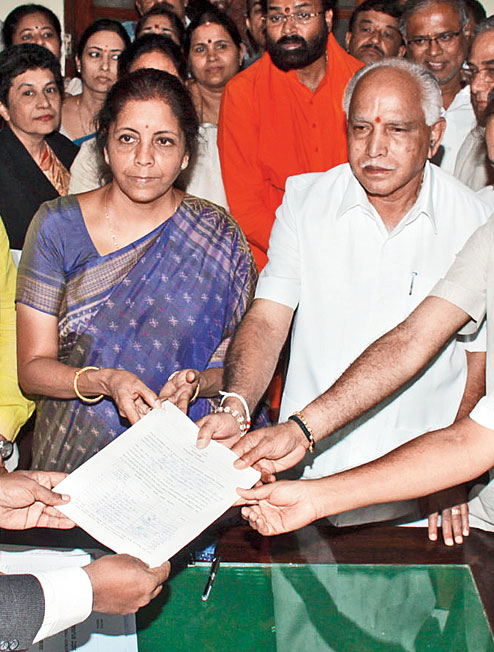
Bangalore, May 31: Manmohan Singh never had to promise to pick up Assamese but Nirmala Sitharaman today announced her plans to learn Kannada, two days after the BJP nominated her from Karnataka for the June 11 Rajya Sabha polls.
The Union minister, a Tamilian by birth, replaces another "outsider", her cabinet colleague M. Venkaiah Naidu whose term is set to expire.
Naidu, a Telugu, has been an upper House member from Karnataka three times running but his failure to learn the local language triggered protests from pro-Kannada organisations and forced him to be shifted to Rajasthan this time.
Rajya Sabha rules do not require a member to be able to speak the language of the state he or she represents, a Constitution bench of the Supreme Court had clarified in August 2003. It had upheld an amendment that dispensed with an upper House candidate's requirement to be a voter in the state from where he or she is fielded.
" Kalithini (I'll learn)," Sitharaman told reporters in Kannada after filing her papers in Bangalore. Asked how fast she might do so, she quipped: "Even now I know a little (Kannada)."
As the reporters continued quizzing her in English, she confidently suggested: "You ask me in Kannada, I'll answer in English."
Sitharaman, elected to the upper House from Andhra Pradesh the last time, punctuated her answers with a few Kannada words here and there.
Asked how she would work for Karnataka after her election, the commerce and industry minister said: " Yaavath reethi (In what way)? I can't say now in detail. But I'll take care of the interests of Karnataka in every way."
Political parties have been fielding outstation Rajya Sabha nominees since decades before the 2003 amendment, although this meant the candidates' names had to be shifted to the voter lists of their new states, where they didn't live.
For instance, Pranab Mukherjee represented Gujarat between 1981 and 1987 while L.K. Advani shifted from Delhi to Gujarat to Madhya Pradesh during his four stints from 1970 to the mid-1990s.
Although "outsider" nominations sometimes left the parties' local hopefuls disgruntled, they rarely triggered public protests at these candidates' lack of knowledge of the local language.
Singh, an upper House member from Assam since 1991, never faced demands that he learn Assamese. Even this time, Congress senior P. Chidambaram has been fielded from Maharashtra without being able to speak Marathi, and BJP minister Suresh Prabhu from Andhra despite his ignorance of Telugu.
Some of these "outsiders" have taken the trouble to learn the local language, though.
Smriti Irani, born to a Punjabi father and Bengali mother, had acquired only a smattering of her Gujarati husband's mother tongue, choosing to converses with him in English. But after being elected to the Rajya Sabha from Gujarat, she made it a point to become a fluent Gujarati speaker.
CPM general secretary Sitaram Yechury is another Rajya Sabha member with a flair for languages. He often breaks into Bengali while talking informally to fellow MPs, although not while addressing the House as a whole.
Unlike the Lok Sabha, where many speak in regional tongues, very few do so in the upper House, where the preferred language is English or Hindi.
Naidu had recently run into a wall of criticism from pro-Kannada organisations and the Janata Dal (Secular), which chastised the BJP for importing "outsiders". Their anger increased when Sitharaman's nomination was announced on Saturday.
"We've been telling all the parties not to field any outsider as they can never understand our problems," T.A. Narayana Gowda, president of the Karnataka Rakshana Vedike, told The Telegraph.
Sitharaman has only had a tenuous connection with Karnataka so far: the parents of her husband Parakala Prabhakar, a Telugu and media adviser to Andhra chief minister Chandrababu Naidu, live in Bangalore.
Gowda expressed scepticism about the minister's promise to learn Kannada. He also slammed the Congress for nominating Jairam Ramesh from the state.
"Ramesh is a Kannadiga only in name: he never lived in this state," Gowda said about the Chikmagalur-born politician who has spent most of his life in Mumbai and Delhi.
Shivananda Gundannavar, leader of a group of techies that started the popular Twitter handle #VenkayyaSakayya (Enough of Venkaiah), expressed disappointment at Sitharaman's nomination.
"We had submitted a memorandum to (BJP state chief) B.S. Yeddyurappa," said Gundannavar, whose group held demonstrations on Sunday urging parties to pick local candidates.
Of the four seats up for grabs, the ruling Congress stands to win two and is battling the JDS for a possible third seat. The Congress has 123 votes in a House of 223 (excluding the Speaker and a nominated member who cannot vote), where 45 votes can ensure a candidate's victory. The BJP and allies have 47 votes and the JDS, 40.
The vacancies have been created by the approaching end of the tenures of Venkaiah and Ayyanur Manjunath of the BJP and Oscar Fernandes of the Congress, and the recent resignation of businessman Vijay Mallya.
While Fernandes was an automatic choice for re-nomination, Ramesh's candidature has disappointed many in the Congress.
The high command has allowed chief minister P.C. Siddaramaiah to pick his old friend and retired police officer K.C. Ramamurthy for a possible third seat. To win it, the Congress will need help from among the nine Independents and the smaller parties.
But the Congress's move to field a third candidate hasn't pleased the JDS, which had helped the party win the Bangalore mayoral vote after last August's civic polls threw up a fractured verdict, with the BJP gaining the highest tally.
Additional reporting by Anita Joshua and Radhika Ramaseshan

